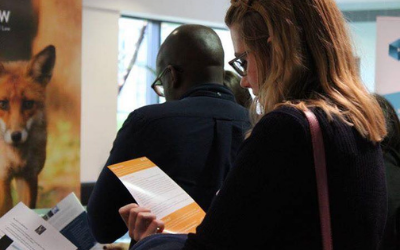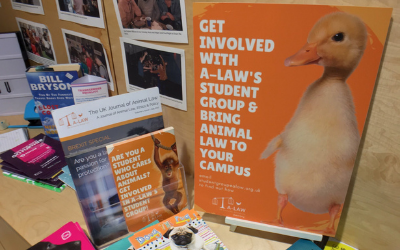Ed. note: Please enjoy this piece originally intended for World Aquatic Animal Day in April. We share in support of the Aquatic Animal Law Initiative and the Animal Law Clinic at Lewis & Clark Law School, as part of their Center for Animal Law Studies. More information at end.
By Lydia Robinson, Trainee Solicitor
What is the Aquatic Animal Law Initiative?
The Aquatic Animal Law Initiative (AALI) is a programme set up by the Lewis & Clark Law School as part of the Center for Animal Law Studies, to investigate, promote, inform, and advocate for the legal protections of aquatic animals.
Aquatic animals – including fish, amphibians, marine mammals, crustaceans, reptiles, molluscs, aquatic birds, aquatic insects and animals such as starfish and corals – are often overlooked in legal and regulatory frameworks that are designed to protect land-based animals.
There is comparatively little research into the welfare, safety, and health of aquatic animals and their production for human use, with an even smaller percentage of this research being widely publicised, disenabling the public and policy makers from making informed decisions.
This may be because, in comparison to many terrestrial farmed animals, it is more problematic to consider the health and needs of one aquatic species in isolation, as both marine and freshwater ecosystems consist of huge numbers of interdependent species in symbiotic relationships, relying on those interactions to survive. Therefore, when considering how to approach the protections of aquatic animals, any policy must consider not just the needs of the individual species, but also the role they hold in their environment.
World Aquatic Animal Day 2020: Aquaculture
To draw global attention to this legal lacuna, AALI and the Animal Law Clinic at the Lewis & Clark Law School have launched an annual “World Aquatic Animal Day”, celebrated this year on April 3, 2020, with this year’s focus on Aquaculture.
Aquaculture is commonly accepted as being the breeding, rearing, and harvesting of aquatic animals (and aquatic plants) for food. For an industry with no legal definition, but known as the “blue revolution” in America, its global output exceeded beef production for the first time in 2012, and farmed aquatic animals amounted to nearly half of all fish and shellfish consumed on Earth.
Key Welfare Issues in Aquaculture
From the conditions fish are raised in, to how they are killed, there are many welfare issues surrounding Aquaculture. Factory farmed fish are reared in confined spaces, preventing them from displaying natural behaviour. For example, an undomesticated salmon might travel over 6,000 miles in the ocean. In comparison, when reared on a farm and at around 75cm long, a salmon could expect the space equivalent of a bathtub of water. Likewise, wild tilapia will create nests, but are prevented from doing so in captivity. The overcrowding of fish in enclosures enables and promotes the spread of disease and parasites, stress to the animals, aggression, and injury.
Water quality is composed of many elements, including mineral content, temperature, oxygen saturation, turbidity, and pH and ammonia levels. The correct combination is crucial to the welfare of the fish, as any imbalance can lead to increased stress and death.
The most mainstream, and one of the cruellest methods of fish slaughter, is asphyxiation without stunning, which can take over an hour to kill. Another popular method of killing fish across Europe involves dumping them into a mixture of ice and water, causing intense pain and stress. The cold causes their metabolism to slow, keeping them fresher for consumption. Undercover footage obtained by Compassion in World Farming shows many fish still alive after this process as they are being packed into boxes for market. Stunning fish is a more humane method of slaughter, but without legislation to make this a requirement, many farmers opt for the more economic option of asphyxiation.
Fish welfare matters because they are sentient animals. Although it is accepted that the composition of their brains differs to mammals, it has been shown that aquatic animals are capable of learning, problem solving, deception, tool use, and memory. In 2009, the European Food Safety Authority admitted that some fish species have the capacity to experience pain. As a result, the Farm Animal Welfare Committee advocated that “aquatic animals should be given the benefit of any reasonable or moral or scientific doubt about their welfare”.
However, this endorsement has not translated into any UK legislation that specifies requirements for the welfare of farmed fish during production and therefore no statutory code of practice. Although the Animal Welfare Act 2006 and the Animal Health and Welfare (Scotland) Act 2006 covers domesticated fish (as vertebrates), the definition of farmed animal under the Welfare of Farmed Animals (England) Regulations 2007) explicitly excludes fish. Fish are, therefore, not offered the more detailed welfare protection afforded to most land-based farmed animals.
In the absence of statutory codes, aquaculture farmers and animal welfare associations in the UK have produced their own codes, such as the 2006 Code of Good Practice for Scottish Finfish Aquaculture and the RSPCA’s Freedom Food assurance scheme for farmed Atlantic Salmon. However, these are voluntary schemes, with no obligation or economic incentive on fish farmers to participate.
How can I get involved?
Although April 3 as passed, AALI would like you to share your efforts on social media (using the hashtag #worldaquaticanimalday) in promoting aquatic animal awareness. This could be by participating in a beach clean, reducing your consumption of single-use plastics, lobbying your local MP to raise awareness of the lack of aquatic animal legislation, reducing or eliminating your consumption of fish, or if you do eat fish, research where it was farmed to ensure you are choosing a sustainably sourced option. You can also support the work of groups seeking to advance protections for fish, such as the Fish Welfare Initiative and Compassion in World Farming.
Resources
Farm animal welfare Committee – Opinion on the Wefare of Farmed Fish (February 2014) https://assets.publishing.service.gov.uk/government/uploads/system/uploads/attachment_data/file/319323/Opinion_on_the_welfare_of_farmed_fish.pdf
“How to Farm a Better Fish” Joel. K Bourne Jr, National Geographic Magazine https://www.nationalgeographic.com/foodfeatures/aquaculture/
Lewis & Clark Law School Initiative https://law.lclark.edu/centers/animal_law_studies/animal_law_clinics/aali/worldaquaticanimalday/







